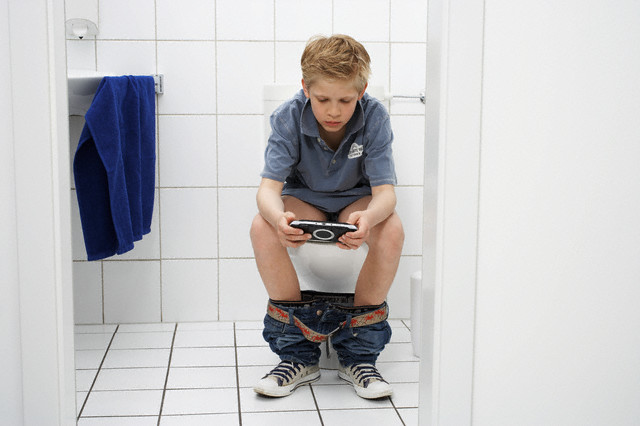Constipation and Soiling in Children
There is a wide range of what is considered "normal" in the stooling (relieving feces) patterns of infants and children.
While the majority of infants, especially bottle fed, have one to three or four stools a day, some breast-fed babies have only one or two stools a week.
It is the consistency of the stool which makes the diagnosis of constipation. Normal stools are soft and easy to pass. If the stools are hard, difficult to pass, and large in caliber, however, then constipation is likely.
Infants can become constipated, especially in warm climates or weather, when inadequate water is given; however, constipation in a newborn or infant may mean something else entirely and needs to be evaluated by your pediatrician.
In older children a little known, but not entirely unheard of, condition comes when constipation gets even more severe and is called encopresis. The child can actually become impacted. Then any newly digested feces (which are liquid) must pass around the outside of the blockage in order to be relieved. This is what is called "soiling."
Encopresis is really constipation masquerading as diarrhea. A problem which is quite puzzling on the surface but readily diagnosed by a good physical examination.
Common Causes of Constipation:
- Unusually slow intestinal motility. Just as a child inherits eye color, he also inherits either a fast or slow moving bowel. Additionally, a substance known as exophenes have recently been discovered which are hormones produced in the small intestines that act like opiates, decreasing intestinal motility. Cow’s milk has been found to stimulate the production of these hormones, which explains why in some people it is quite constipating.
- High protein/low fiber diet. Stool passage may be infrequent if the diet contains low residue foods like milk and milk products, high pectin foods like bananas, apples, Jell-O and meat.
- Chronic medications such as Imipramine (for bed wetting), Ritalin (for hyperactivity), or narcotic containing cough syrups may cause constipation.
- Inadequate water intake is another cause especially in infants.
- Spinal cord defects or injuries can cause elimination problems by inadequate or defective nervous system impulses.
- Poor "mechanics" of elimination can be caused by: Hypothyroidism, a pelvic mass or tumor causing weak muscle diseases, or abnormal placement of the anus; and,
- Neurofibromatosis, a neurologic disorder in which benign tumors grow throughout the body, also causes constipation.
Soiling or Encopresis:
 One thing about constipation in children is that once they have had it and experience a fair amount of pain with defecation, they tend to subsequently "withhold" their stools as long as they can, to avoid the pain.
One thing about constipation in children is that once they have had it and experience a fair amount of pain with defecation, they tend to subsequently "withhold" their stools as long as they can, to avoid the pain.
This is particularly true if there has been any rectal tearing or bleeding. However, any reason that a chld has to start "holding it" (like being "too" busy or emotionally traumatized) is able to start the cycle.
Physical examinations should include a thorough history and an examination to rule out all of the above types of disorders.
Measurement of sensation in the lower extremities should be made to rule out spinal cord problems.
The strength of the anal sphincter and its placement are checked on rectal examination as is the size of the rectal vault and its contents.
Skin, hair, and nail are checked for evidence of endocrine problems; and muscular strength is checked.
A thorough history should be taken for other associated symptoms as well as medication, diet preferences, and water intake.
By far, the majority of children have self limited constipations secondary to dietary problems. If it progresses, however, to soiling treatment should begin with a thorough bowel clean-out usually using enemas, and rarely requiring hospitalization.
Treatment:
Dietary change is essential. The child must increase fluids as well as using a high-fiber diet with elimination of food substances known to be constipating.
For six to eight weeks children should eliminate milk and milk products, apples, apple juice, carrots, rice, and Jell-O from their diets.
They should receive increased amounts of bulk foods, and possibly three or more teaspoons of unprocessed bran per day.
They should sit on the toilet approximately fifteen minutes after the same meal each day and for a period of ten minutes.
When regular defecation occurs approximately every 24-48 hours, soiling has ceased, and dietary changes have been made for two to three months, the gradual restoration of the restricted food items may be made, of course stopping again if the stools become too firm.
Laxatives should not be used, as they frequently make the problem worse. There are other treatments that vary depending on the preference of a physician.
Some use enemas as needed every two to three days. Others use mineral oil for several months, which softens the stool. And others have used other types of stool softeners.
Often psychological counseling is necessary and beneficial for both the child and the family, in order to help explain, demystify, and remove guilt and to work on the behaviors surrounding the "withholding."
Advertisement by Google
(sorry, only few pages have ads)

